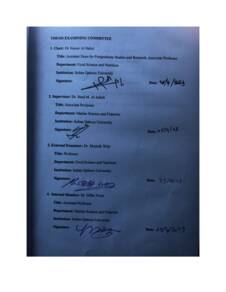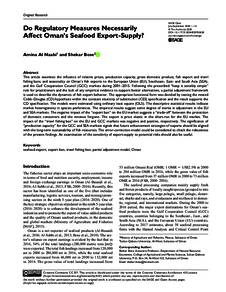Document
Assessment of seafood traceability in Omani seafood establishments.
Publisher
Sultan Qaboos University.
Gregorian
2023
Language
English
Subject
English abstract
Seafood is a dominant sector in the global food industry and remains one of the fastest
growing protein sources consumed world-wide. Food corporations recognize that
commercial transparency and traceability are critical to brand enhancement, risk
mitigation, food safety, and consumer confidence. The capacity to track a seafood
through specific production, processing, and distribution stages is known as the seafood
traceability system (STS). Nonetheless in Oman, seafood often moves very long
distances, in and out of multiple ports, and changes hands among various brokers,
wholesalers, processors, and retailers before reaching the consumer. Currently, only a
fraction of wild-caught fish products can be sufficiently traced to meet these growing
demands for transparency among the establishments.
The present study aims to assess the current implementation of the STS in the seafood
establishments in the Sultanate of Oman and identify the gaps in seafood traceability
needed for a better implementation and outcomes. The study was conducted using a
questionnaire, and the approach was based on Likert scales (1–5), close-ended
questions, and open-ended questions (providing a descriptive response). Two sets of
questionnaires, in English and Arabic, were designed to target two groups of
participants: seafood establishments and government officials. The questionnaires were
distributed "online" and by personal visits depending on the location of the
establishment. The questionnaire received responses from 32 seafood establishments
and 16 government officials. Answers were analyzed using baseline statistics (means,
modes, median, and range), normality test using shapiro-wilk test, in addition to the
Chi-square test, and one sample t-test or one-sample Wilcoxon signed rank test where
applicable. In addition, the internal answers consistency was validated by using the
Cronbach Alpha index.
Results indicated that the governmental officials are only agreed on the laws and
regulations in addressing and covering the legal requirements of the STS. The seafood
establishments believe that they will benefit from the implementation of STS within the
supply chain, but at the same time, they think that it will be difficult to implement. The
seafood industry is more optimistic/positive about the current STS implementation than
the officials. There is a strong need to implement STS throughout the supply chains
(internal and external, domestic and export). There are difficulties and gaps with STS
implementation in Oman (awareness, technology, knowledge and research,
implementation), and it is a necessity to bridge the gaps between the government and
Omani seafood establishments. The study recommended, among others, that 1) the
government and the seafood establishment must collaborate to improve communication
between them, 2) raise public understanding of the advantages of STS, the government
and interested organizations should sponsor awareness-raising campaign, 3) It is
strongly advised that cost-benefit analysis studies be conducted, and the findings should
be communicated to possible stakeholders. In addition, it's important to research the
variables that influence STS adoption.
Member of
Resource URL
Arabic abstract
تعد الاغذية البحرية من القطاعات المهيمنة في صناعة الاغذية العالمية وتظل أحد مصادر البروتين المستهلكة الاسرع نمًو التجارية وإمكانية التتبع أمور بالغة الاهميه ا في جميع أنحاء العالم. تدرك شركات الاغذية أن الشفافية ثقة المستهلك. تُعرف القدرة على تتبع لتعزيز العلامة التجارية ، وتخفيف المخاطر ، وسالمة الاغذية ، ولكسب الاغذية البحرية من خلال مراحل إنتاج ومعالجة وتوزيع محددة باسم نظام تتبع المأكولات البحرية (STS(. ومع ذلك ، في سلطنة عمان ، غالبًا ما تنتقل الاغذية البحرية لمسافات طويلة جدًا ، داخل وخارج الموانئ المتعددة ، وتنقل بين العديد من الوسطاء وتجار الجملة والمعالجات وتجار التجزئة قبل الوصول إلى المستهلك. في الوقت الحالي ، يمكن تتبع نسبة ضئيلة فقط من المنتجات السمكية بشكل كاف لتلبية الطلب المتزايد عن الشفافية بين المؤسسات. تهدف الدراسة الحالية إلى تقييم تطبيق نظام الـ STS في مؤسسات وشركات الاغذية البحرية في سلطنة عمان وتحديد وتعريف الثغرات أو الفجوات في النظام الحالي بهدف التحسين والتطوير. أجريت الدراسة باستخدام الاستبانات ، واعتمد النهج على مقاييس ليكرت )1-5( ، والاسئلة المغلقة والمفتوحة )توفير إجابة وصفية(. تم تصميم مجموعتين من الاستبانات ، باللغتين الانجليزية والعربية ، واستهداف مجموعتين من المشاركين: "مؤسسات وشركات الاسماك و المأكولات البحرية" و"عدد من المسؤولين الحكوميين" في ذات المجال. تم توزيع الاستبانات "عبر الانترنت" والزيارات الشخصية حسب موقع الشركة. تم الحصول على 32 رد من شركات الاسماك و 16 ردا من المسؤولين الحكوميين. تم تحليل الاجابات باستخدام الطرق الاحصائية الاساسيه )المتوسط الحسابي ، والمنوال، والوسيط ، والمدى ، بالاضافة إلى اختبار مربع كاي لإلستقالليه وإختبار ال test-t حيثما ينطبق ذلك(. بالاضافة إلى ذلك ، تم التحقق من صحة تناسق الاجابات المقدمة من المشاركين بإستخدام مؤشر Cronbach Alpha. أشارت النتائج إلى أن المسؤولين الحكوميين متفقون على توفرالقوانين واللوائح في معالجة وتغطية المتطلبات القانونية لنظام الـ STS. وتعتقد شركات الاسماك و الاغذية البحرية أنها ستستفيد من تنفيذ STS ضمن جميع سلسلة التوريد ، لكنها تعتقد في الوقت نفسه أنه سيكون من الصعب تنفيذها. يظهر أن هناك شركات الاسماك تفاؤلابشأن تنفيذ STS الحالي من المسؤولين. كما أن هناك حاجة قوية لتطبيق STS في جميع أكثر / إيجابية سالسل التوريد )الداخلية والخارجية والمحلية والتصدير(. هناك صعوبات وثغرات في تنفيذ STS في عمان )الوعي والتكنولوجيا والمعرفة والبحث والتنفيذ( ، ومن الضروري سد هذه الفجوات بين الحكومة وشركات ومؤسسات الاغذية البحرية العمانية. من أهم توصيات الدراسة الحالية، وصايا أخرى ، بأن 1( يجب أن تتعاون 8 الحكومة وشركات ومؤسسة الاغذية البحرية لتحسين التواصل بينهما ، 2( زيادة فهم العامة لمزايا STS ، وبالاتالي يجب على الحكومة المؤسسات المهتمة والمستفيدة رعاية حملة زيادة الوعي ، 3( كما ينصح بشدة بإجراء دراسات تحليل التكلفة والفائدة ، ومشاركة النتائج مع أصحاب المصلحة. بالاضافة فإنه من المهم البحث عن المتغيرات التي تؤثر على تبني تطبيق نظام ال STS.
Category
Theses and Dissertations


